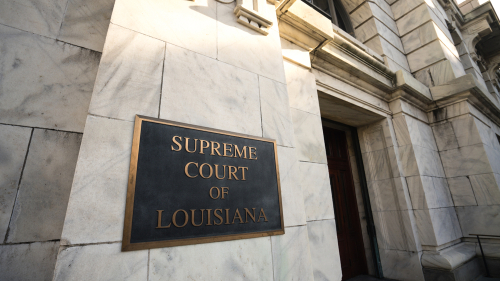On Wednesday, the Governor of Louisiana signed legislation that gives Black voters in the Baton Rouge area an equal opportunity to elect a candidate of their choice to the Louisiana Supreme Court by creating a judicial election district with a majority of Black voters anchored in Baton Rouge. For decades, the district lines in the Baton Rouge area had been drawn in a way that split the Black voting population, diluting their voting power.
The Lawyers’ Committee for Civil Rights Under Law and co-counsel Arthur R. Thomas of Arthur R. Thomas & Associates and Bryan Cave Leighton Paisner (BCLP) filed a lawsuit in 2019 on behalf of the Louisiana State Conference of the NAACP and individual plaintiffs Reverend Anthony C. Allen Sr. and Stephanie Anthony from Baton Rouge, under Section 2 of the Voting Rights Act, seeking the creation of a Black-majority district so as to make the process of electing Justices to the Louisiana Supreme Court equally open to Black voters in the Baton Rouge area as it is to other voters. The legislation resolves the lawsuit and creates a second majority Black voter district to add to the existing Black majority district anchored in New Orleans, which was created under a federal court Consent Decree in 1991.
Jennifer Nwachukwu, Plaintiffs’ attorney and Senior Counsel from the Lawyers’ Committee for Civil Rights Under Law, said, “The new map gives Black people an equal voice in who sits on the Louisiana Supreme Court. The map has not been redrawn since the 1990s, and it’s about time the people of Baton Rouge have a fair say as to who sits on the highest court of their state.”
“The passage and signing of this legislation serves as a beacon of hope for Black America. The NAACP stands firm in our belief that voting access must be expanded, not restricted,” said Janette McCarthy Wallace, NAACP General Counsel. “That’s why we continue to fight back against undemocratic voter suppression attempts while advocating for pivotal policies like this one. Democracy may be under attack, but we’ll continue to do everything in our power to fight back. For our culture, and our community.”
Plaintiff Reverend Anthony C. Allen Sr. said, “This is a historic moment for the State of Louisiana. We are pleased that the Legislature has created a second black majority district for the Supreme Court, and that unlike in 1997 when the first Black majority district was created, this time it is not under a court order. The case is now being resolved legislatively to create a second Black majority district giving Black residents more representation on the Louisiana Supreme Court. This is a win for the people of Louisiana.”
Dr. Michael McLanahan, Louisiana State NAACP Conference President said, “The NAACP Louisiana State Conference proudly carries the banner of fighting for freedom, justice and equality for all. Almost since its birth, Louisiana has been the breeding ground for hatred, bigotry, discrimination and downright evil. But in 2024 good prevailed over evil and justice prevailed over injustice. The right for Black Louisianans to vote for the Associate Supreme Court Justice of their choice has prevailed. We must continue to tear down these slave strongholds to ensure there is a just society for future generations. This victory today proves that when we fight, we win. But just as important when we vote, we win.”
Arthur R. Thomas, Plaintiffs’ attorney, said, “We put our very hearts and soul in litigating this case involving redistricting of the Louisiana Supreme Court and ensuring the State of Louisiana is required to immediately redraw the Louisiana Supreme Court Districts, so that all future Louisiana Supreme Court elections will be conducted in compliance with the Constitution of the United States and the Voting Rights Acts. The net results of the resolution of this litigation will create the opportunity for the election of a minimum of two Black Justices on the Louisiana Supreme Court.”
Meryl Macklin, BCLP Partner, Plaintiffs’ attorney, said, “BCLP is proud to be a part of this historic case ensuring that in the future, Black voters can fairly participate in Louisiana Supreme Court elections. We are thrilled to see the new majority black voting district signed into legislation.”
###


